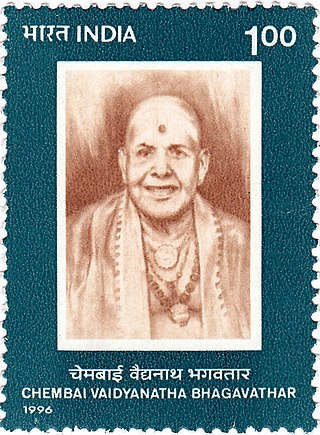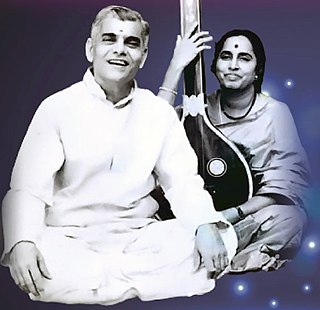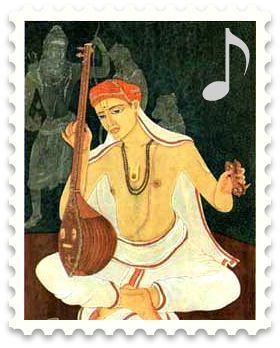| Carnatic music |
|---|
 |
| Concepts |
| Compositions |
| Instruments |
|
This is a list of Carnatic instrumentalists: musicians famous for playing the carnatic music of South India. Musicians are listed by the instrument they have played.
| Carnatic music |
|---|
 |
| Concepts |
| Compositions |
| Instruments |
|
This is a list of Carnatic instrumentalists: musicians famous for playing the carnatic music of South India. Musicians are listed by the instrument they have played.




Semmangudi Radhakrishna Srinivasa Iyer was an Indian Carnatic vocalist. He was the youngest recipient of the Sangeetha Kalanidhi awarded by the Music Academy in 1947, a distinction he holds to this day as of 2023, probably the only musician to receive that honour before reaching 40. He had received many other awards as well, including Padma Bhushan and Padma Vibhushan from the Government of India, Rajyasevanirata title from Travancore's erstwhile ruling family, Sangeet Natak Academy award (1953), Isai Perarignar from Government of Tamil Nadu and Kalidas Samman from Government of Madhya Pradesh. He was affectionately addressed as "Semmangudi Maama" by his disciples. He was also considered the "Pitamaha" or the grand sire of modern Carnatic Music. He was conferred with an honorary doctorate by University of Kerala in 1979.

Lalgudi Gopala Jayaraman was an Indian Carnatic violinist, vocalist and composer. He is commonly grouped with M.S. Gopalakrishnan and T.N.Krishnan as part of the violin-trinity of Carnatic Music. He was awarded Padma Bhushan by the Government of India in 2001.
Shri Ramani Thiagarajan is an Indian musician.

Chembai Vaidyanatha Bhagavatar was an Indian Carnatic music singer from Kerala. He was born in Kozhikode, and moved to Palakkad along with him family during his childhood. He is popularly known as Chembai, or sometimes simply as Bhagavatar. Chembai was noted for his powerful voice and majestic style of singing. His first public performance was in 1904, when he was nine. A recipient of several titles and honours, he was known for his encouragement of upcoming musicians and ability to spot new talent. He was responsible for popularising compositions like Rakshamam Saranagatam and Pavana Guru, among others.

Palghat Kollengode Viswanathan Narayanaswamy, often referred to as K. V. Narayanaswamy was an Indian musician, widely considered to be among the finest Carnatic music vocalists of the 20th century. He was awarded the Madras Music Academy's Sangeetha Kalanidhi in 1986. He was described as the "Perfect Knight" of Carnatic music, a phrase from Geoffrey Chaucer, by V. K. Narayana Menon, art critic of India and recipient of the Sangeet Natak Akademi Fellowship.

Sangeet Natak Akademi Award, also known as the Akademi Puraskar, is an award given by the Sangeet Natak Akademi, India's National Academy of Music, Dance & Drama. It is the highest Indian recognition given to people in the field of performing arts.

The Kalaimamani is the highest civilian award in the state of Tamil Nadu, India. These awards are given by the Tamil Nadu Iyal Isai Nataka Mandram, a unit of the Directorate of Art and Culture, Government of Tamil Nadu, to recognise artists in the state for their achievements.
This is a listing of the commercially published recordings of Chembai Vaidyanatha Bhagavatar (1895-1974).

Alathur Brothers Srinivasa Iyer (1911–1980) & Sivasubramania Iyer (1916–1965) were Carnatic vocalists. The world of Carnatic music knows them as the star duo of the twentieth century. They learnt under Alathur Venkatesa Iyer, the father of Sivasubramania Iyer. They were not brothers by birth but were rather bound by the brotherhood of music. Srinivasa Iyer was born to Angarai Sankara Sroudigal and Lakshmi Ammal at Ariyalur village as one of 12 siblings.

Thanu Krishna Murthy, better known as T. K. Murthy, is an Indian mridangam player. Murthy is a Padma Shri and Sangeetha Kalanidhi awardee.

Ramanathapuram C. S. Murugabhoopathy, popularly referred to as CSM, was one of the most distinguished Mridanga maestros of the 20th century. He was a contemporary of Palghat Mani Iyer (1912–1981) and Palani Subramania Pillai (1908–1962). The three legends are revered as the "Holy Trinity of Mridanga".
The Rudrapatnam Brothers are an Indian Carnatic vocal duo, consisting of brothers R. N. Thyagarajan and Dr. R. N. Tharanathan. The brothers come from a family of musicians from Rudrapatna village off the Kaveri banks in Arkalgud Thaluk of Hassan district in the southwest Indian state of Karnataka. Vocalist Tiger Varadachariar, on seeing the musical atmosphere there, once claimed that "Rudrapatnam is the Thanjavur of Karnataka". Music, Veda adhyayana, and studying Sanskrit were integral parts of their family tradition.

Thrissur C. Narendran is a Mridangam artiste from Kerala, India. His intricate rhythmic patterns, sense of proportion, sharp anticipation, short & carefully thought out phases of silence, and the ability to give the Mridangam the much-needed soft touch sets Trichur C. Narendran a apart. Narendran has also accompanied more than five generations of musicians.
Abhishek Raghuram is an Indian carnatic vocalist.

Vellore G. Ramabhadran was a Mridangam artiste from Tamil Nadu, India. He was awarded the Madras Music Academy's Sangeetha Kalanidhi in 2004.

Ombathuveli Subrahmanyam Thyagarajan was an Indian carnatic musician based in Chennai.
Valayapatti A. R. Subramaniam is an Indian classical musician and percussionist, considered by many as one of the foremost prominent exponents of thavil also known as dolu, a traditional percussion instrument in Carnatic music, accompanying windpipe instruments such as nadaswaram, saxophone, clarinet, etc, and string instruments like violin, mandolin, etc. He was awarded the Madras Music Academy's Sangeetha Kalanidhi in 2009. He is a recipient of the Sangeet Natak Akademi Award. The Government of India awarded him the fourth highest civilian honour of the Padma Shri, in 2007, for his contributions to Music.

Tanjavur R. Ramamoorthy was a vidwan in Indian classical music, playing Carnatic music on the mridangam, an ancient Indian percussion instrument. The mridangam is the primary rhythmic accompaniment in a Carnatic music ensemble, and in the Dhrupad genre, where it is known as a pakhawaj.